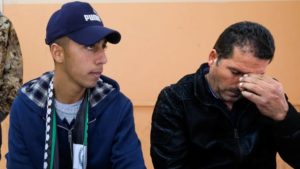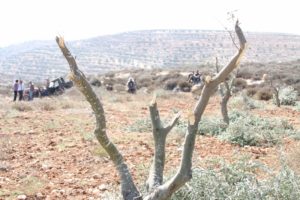Palestinian Teen Hiking With Friends Was Killed in Israeli Army Ambush. He Posed No Danger

Ahmed Hamad, Ayman’s father, and Mohammed Hamad, who was wounded in the incident
Gideon Levy and Alex Levac write in Haaretz, 1 February 2018,
“The soldiers hid behind the tallest oak tree in the valley. That’s where the six teenagers were headed, as they descended from their town, Silwad, northeast of Ramallah, into the deep, steep valley to hang out together on that Friday afternoon. On the way, they bought potato chips, sunflower seeds and chocolate, and they planned to boil water for tea over a campfire. Suddenly, without warning, a gunshot rang out. The teens had no idea where it came from. Ayman collapsed, rolling over and landing on his back. A bullet had sliced through his chest from the left, below his neck, and exited from his hip. When Mohammed tried to approach, to pull him out of the line of fire, another shot rang out. Mohammed was hit in the arm and ran for his life.
Ayman lay on the ground, dying.
The firing grew more intense. The shooters emerged from the ambush site behind the oak tree. They were joined by two more soldiers who came out of an Isuzu jeep parked on the other side of Highway 60. Bursts of automatic gunfire, aimed at the teens who were fleeing for their lives, echoed through the valley. The group rushed up the hill on which Silwad – meaning “above the wadi” in Arabic – is perched.
That evening, the Israel Defense Forces returned Ayman Hamad’s body to his family. He was 17 years old and was buried the next day in the town.
Not far away, on that same day, last Saturday, January 26, settlers from the outpost of Adei Ad, and/or soldiers who joined them – it is still not clear – killed Hamdi Na’asan, 38, as he was plowing his field next to his village, Al-Mughayyir. Last weekend was particularly lethal for the Palestinians. Four of them were killed by Israelis, in the Gaza Strip, Jerusalem and the West Bank.

Al Mughayyir village
It was raining when we visited Silwad on Monday, and the killing field in the valley that separates the town from Highway 60 was draped in thick fog. Through the fog a stunning view could be made out – of olive trees, the towering oak and the verdant valley. The last house in town, on the wadi’s edge, belongs to Qadura Fares, head of the Palestinian Prisoners Club, a former cabinet minister and prisoner. Fares, fluent in Hebrew, is one of the more impressive leaders in the Palestinian Authority, an associate and good friend of the jailed Palestinian leader Marwan Barghouti.
The Silwad community center – above which looms the turret of the local mosque that locals say is the tallest in Palestine – had been turned into a venue of mourning and condolences. The dead teenager was a relative of Fares’, who, in an elegant wool coat, was among those welcoming the guests who had come to comfort the family. Next to him was the bereaved father, Ahmed Hamad, 44, a metalworker who once had four daughters and two sons. Now, he has four daughters and one son.
According to the dead teen’s history teacher, Aouni Fares, Ayman, a high-school senior, was well-informed and knew a lot about the Nakba, the Palestinians’ suffering and the history of the occupation that began in 1967. Ahmed Hamad says his son promised him that he would always be proud of him. Ayman’s uncle Mohammed Othman was the first fatal casualty in Silwad during the first intifada; two other uncles, Akram Hamad and Rifat Hamad, are serving life sentences in Israeli prisons.
Last Friday morning, Ayman had coffee with his father and then attended prayers in the mosque. At midday the family drove to its olive grove in the valley for a picnic, not far from the place where their firstborn would be killed a few hours later. The weather was ideal, under the winter sun, and Ayman was in high spirits, the mourners recall. The family ate stuffed vegetables prepared by the mother, Inas; Ayman cleared away the dishes.” This article is printed in its entirety.
